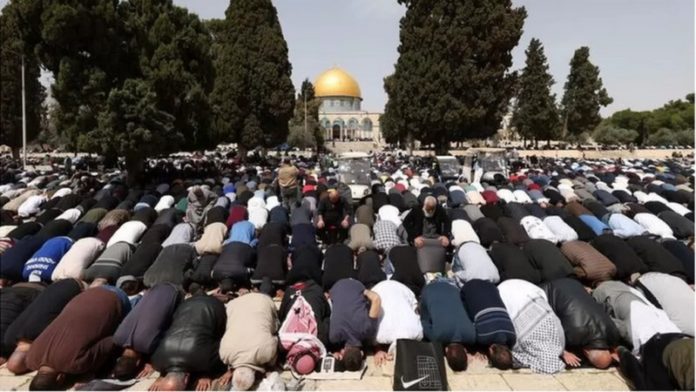As so often in the past, the latest scenes of violence at Jerusalem’s most important holy site for Muslims and Jews are igniting widespread anger.
In one social media video, heavily armed Israeli police apparently use a rifle butt and sticks to beat Palestinian worshippers who had barricaded themselves inside the al-Aqsa mosque.
Israeli police have released their own footage which seems to show fireworks thrown by Palestinians, lighting up the prayer hall.
Pictures of the aftermath show overturned furniture and prayer mats scattered across the carpet.
With tensions already running high in the occupied West Bank and East Jerusalem, for months, officials and diplomats have been warning about the risk of a new round of violence in this sacred spot at a highly sensitive time.

The al-Aqsa Mosque compound/Haram al-Sharif is the third holiest place in Islam. It is also known as Temple Mount, the holiest site in Judaism.
In the past, the compound has often seen clashes between Palestinian worshippers and Israeli security forces, triggering wider unrest.
In May 2021, an Israeli raid here contributed to an 11-day full-scale conflict between Israel and Hamas, the Islamist militant group which governs the Gaza Strip.
Last year, the first time that the Islamic holy month of Ramadan and the week-long Jewish holiday of Passover coincided in three decades, there were violent scenes over successive days as Israeli police cleared the courtyard before escorting Jewish visitors into the compound.
They said that stones were also thrown towards the Western Wall, down below the compound, the holiest place where Jews are allowed to pray.
From Wednesday evening, Ramadan and Passover overlap again. The next two weekends also mark Easter for Western churches and Eastern Orthodox ones.
All of the festivals draw more religious visitors to the Old City. As well as locals, some 60,000 tourists were due to arrive in Israel this week, according to official figures.
In recent days, there has been a festive buzz in the air at the gates of Jerusalem’s Old City.
Palestinians I spoke to were pleased there had been a huge turnout for prayers on the second Friday of Ramadan – with some 250,000 people attending, according to the Islamic Waqf which administers the site. Israeli authorities allowed some 70,000 Palestinians to enter Jerusalem from the West Bank.
Tens of thousands of Christians also gathered for Sunday’s Palm Sunday procession from the Mount of Olives.
“This was good, but it’s always the political people who can make fire. That’s what everyone’s afraid of,” said Palestinian souvenir seller Marwan, as he sold candles to Christian pilgrims heading to the Church of the Holy Sepulchre – built where Christians believe Jesus was crucified, buried and resurrected.

Prior to Wednesday’s morning’s unrest, Hamas called for worshippers to seal themselves in al-Aqsa mosque to stop a plan by Jewish extremists to try to sacrifice a goat for Passover at the hilltop site, resurrecting a biblical tradition.
Clashes began after a few hundred Palestinians barricaded themselves in the mosque after Ramadan prayers.
The majority were soon cleared out by Israeli police, but dozens remained inside. Police stated that what ensued was a “violent riot” by “lawbreakers and troublemakers” who they say desecrated the mosque.
Palestinian leaders condemned the Israeli attacks on worshippers as a crime, saying a “red line” had been crossed. Militants in Gaza swiftly responded by firing rockets at southern Israel, prompting Israel warplanes to bomb sites there linked to Hamas.
Jordan and Egypt, both involved in recent Washington-backed efforts to de-escalate tensions between Israel and the Palestinians, were also highly critical of Israel’s actions.
Fears of further confrontations in the coming days are now heightened, particularly if Israeli officials such as the far-right National Security Minister Itamar Ben Gvir make a visit, or if Israeli police allow Jewish activists to pray at the sensitive site, breaking fragile, decades-old rules which apply there.
“We are always concerned about the attempts of Jewish extremists to upset the status quo,” Dr Mustafa Abu Sway, an Islamic scholar and member of the Islamic Waqf Council in Jerusalem, told me earlier this week.
He said the important last 10 days of Ramadan which begin next Tuesday, leading into Laylat al-Qadr, the Night of Power, were a particular issue.
“Historically, Israel as an occupying force prevented Jewish extremists from entering during these 10 days. But with such a government in place, we are concerned that they will allow it,” he said.
Israeli authorities insist that they act to preserve freedom of worship at the religious site, which plays a highly symbolic role in the nationalist narratives of Israelis and Palestinians.
It is believed by Muslims to be the location where the Prophet Mohammed ascended to Heaven, while Jews revere it as the site of two Biblical temples, the second of which was destroyed in Roman times.

